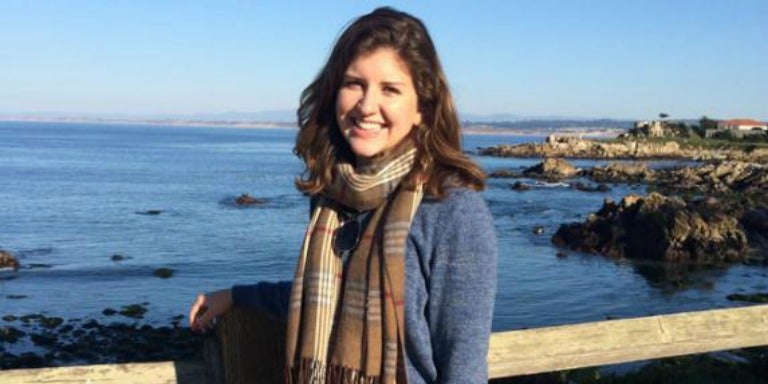Title: Georgetown Law Students Observe Guantanamo’s Military Commissions
Three Georgetown Law students have observed U.S. military commissions in Guantanamo Bay since the school was approved as an official observer organization this past August.

Only a glass wall separated Anna Kent, a third-year Georgetown Law student, from Abd al Hadi al-Iraqi, an alleged al-Qaeda commander, at the U.S. Naval Center courtroom in Guantanamo Bay.
It was al Hadi’s pretrial hearing this past November, and Kent was one of the 13 NGO observers invited by the U.S. Department of Defense to watch the proceedings.
The most shocking part of the courtroom experience, Kent said, was the choice of translation technologies given to al Hadi – a speaker and a pair of ear buds.
“The guide reminded us that some of the detainees refuse to listen to anything through ear buds, since one of the interrogation techniques was to play extremely loud music for hours or days on end,” she explained.
Official Observer
Georgetown prides itself on experiential learning and this latest initiative is a tremendous opportunity for students to see the law as it is applied.”
—William M. Treanor, Georgetown University Law Center Dean
Since 2008, the U.S. government has invited a limited number of civil rights, legal and education institutions to observe its military commissions and document their transparency and credibility.
Georgetown Law was approved as an official observer organization in late August, and has since sent Kent, Kayleigh Golish (L’15) and B. Shaw Drake (L’15) to attend weeklong hearings.
“People generally have a negative reaction to Guantanamo based on visceral, disturbing stories from the past,” said Kent. “Now things are changing.”
The students’ time in Guantanamo was spent in the courtroom and in conversation with members of the defense and prosecution teams, media and other observers, giving them insight into the complex and evolving system of law at Guantanamo Bay.
“Georgetown prides itself on experiential learning,” said Law Center Dean William M. Treanor, “and this latest initiative is a tremendous opportunity for students to see the law as it is applied.”
Pretrial Procedures
Guantanamo’s military commissions are a new system of justice, unlike federal courts or courts-martial.
Many procedural questions – such as what type of evidence the government can enter against a defendant and the way in which that evidence has been obtained – must be litigated before trials can begin.
Kent and Golish both attended pretrial hearings at Guantanamo that could shape trial outcomes and set precedent for military commissions in the future.
“These hearings determine what comes before a court,” Golish explained. “And the evidence that comes in can have a huge determination on how the narrative unfolds before a jury and the judge.”
The Georgetown Program
Georgetown observers are selected and supported by the Law Center’s Human Rights Institute and the Law Center’sCenter for National Security and the Law.
Co-organizer Ian Kysel traveled to Guantanamo Bay last summer with the ACLU and rallied for Georgetown to apply for observer status upon his return.
“There’s really no substitute for being in the courtroom for understanding how the law is developing,” said Kysel, the Dash/Muse Fellow at the Human Rights Institute.
“It’s really hard based on reading the transcript – which is produced weeks later with parts redacted – to get a full sense of how the proceedings are evolving.”
Spring 2015
The Law Center will continue to send 2L, 3L and LL.M. students to Guantanamo Bay this semester, as invitations are issued by the Department of Defense.
“I went into these military commissions with preconceived notions that they were categorically unfair,” said Golish. “I left realizing they occupy more of a legal grey area, but there is still much room for improvement to ensure fairness in the process.”
Golish recommends that eligible students apply to the program.
“It encourages you to look at all sides and to question your perspective,” she added.